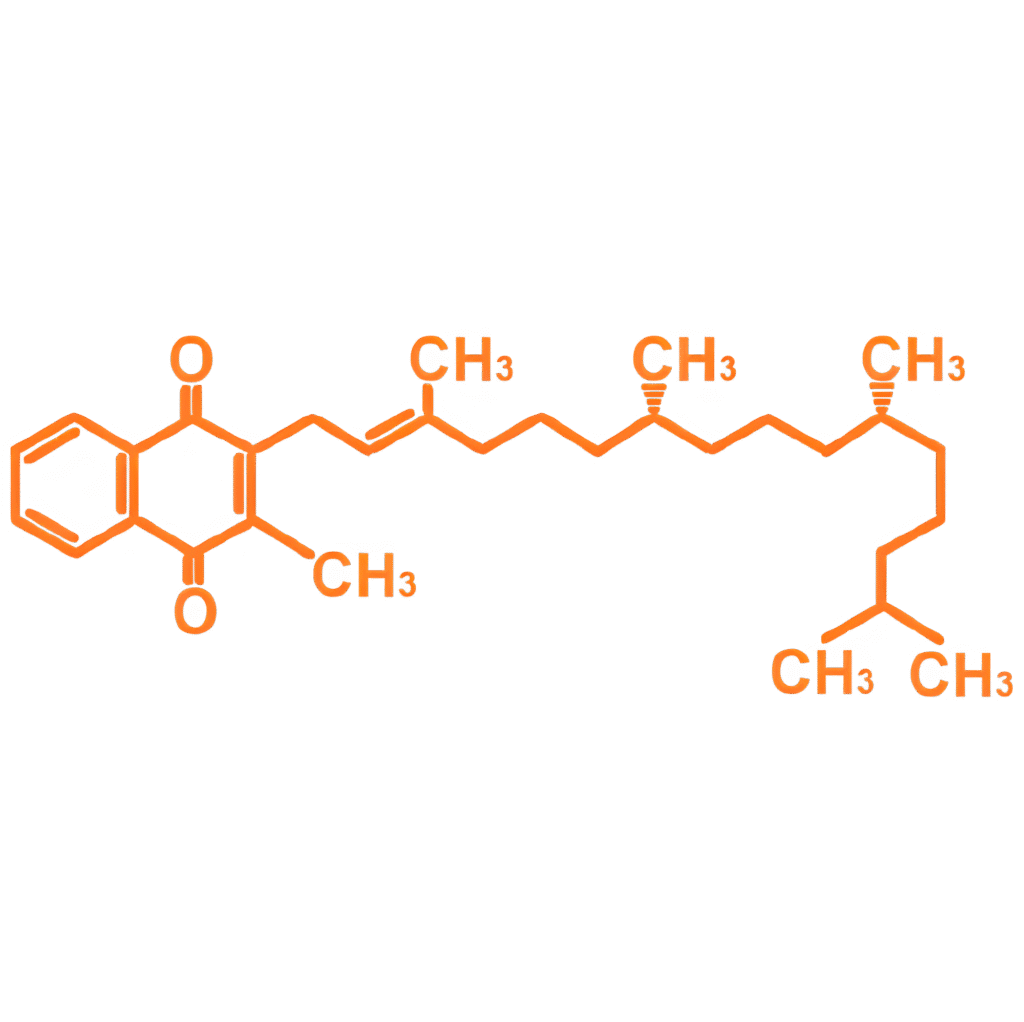Struggling with stubborn soreness, slower recovery, or unexpected dips in performance? Low Vitamin K levels can affect recovery, bone strength, and cardiovascular health. Learn how it supports performance and why it matters.
Navigation: Stack Index | Vitamins | Minerals | Supplements

Vitamin K often flies under the radar in conversations about performance and recovery. Most people associate it with blood clotting, but its role goes far beyond that—impacting bone density, cardiovascular health, muscle repair, and cellular energy production. When Vitamin K levels drop, these critical systems start to falter, leading to slower recovery, weakened bones, and increased risk of arterial calcification.
For athletes, biohackers, and anyone focused on long-term vitality, maintaining optimal Vitamin K is essential.
Article Contents
- Functions & Mechanism
- Sources (Food & Supplementation)
- How to Use (Dosing & Timing)
- Optimization Stacks
- Signs of Deficiency
- Risks & Safety
- What Biohackers Get Right
- References & Further Reading
One of the biggest reasons Vitamin K deserves your attention is that it supports Vitamin D supplementation. Without enough Vitamin K2, calcium can build up in places you don’t want—like your arteries and soft tissues. This misplaced calcium can stiffen blood vessels, increase inflammation, and quietly undermine your cardiovascular health. Vitamin K helps direct calcium to where it’s needed — your bones and muscles — keeping your arteries clear and your body performing at its best.
There are two main forms you should know about: Vitamin K1, mostly from leafy greens, supports blood clotting, while Vitamin K2 — the rising star in biohacking circles — plays a key role in bone and cardiovascular health. K2 isn’t as common in a typical diet and depends partly on gut bacteria production, which means modern lifestyles, antibiotics, and diet choices can leave you short.
If you’ve dealt with stubborn joint pain, unexplained muscle cramps, or that creeping sense of wear and tear despite staying healthy and eating well, Vitamin K could be the missing piece. It helps control inflammation, supports mitochondrial energy production, and plays a subtle but important role in hormone balance and recovery pathways. It’s not just about avoiding deficiency — optimizing Vitamin K levels can help your body recover faster, resist injury, and power through stress without breaking down.
Functions & Mechanism
Vitamin K exists primarily in two forms: K1 (phylloquinone), found in leafy greens, and K2 (menaquinone), produced by gut bacteria and found in fermented foods. The active form activates proteins like osteocalcin and matrix Gla-protein (MGP) that control calcium use throughout your body.
- Bone & Muscle Health: Activates osteocalcin to incorporate calcium into bone matrix, improving bone density and aiding muscle function and repair.
- Cardiovascular Protection: Activates MGP, which prevents calcium buildup in arteries, reducing risk of arterial stiffness and heart disease.
- Inflammation & Recovery: Modulates inflammatory pathways to help control chronic inflammation that impairs recovery and performance.
- Supports Mitochondrial Energy: Emerging research suggests K2 improves mitochondrial efficiency, helping your cells produce more energy for endurance and mental focus.
Sources (Food & Supplementation)
Vitamin K1 is abundant in leafy greens like kale, spinach, and broccoli, but the K2 form is harder to get in a typical diet. K2 is found in fermented foods such as natto, sauerkraut, and certain cheeses, and is also produced by healthy gut bacteria.
Many biohackers prefer supplementing with Vitamin K2 (especially MK-7), which has better absorption and a longer half-life, making it more effective at optimizing these crucial functions.
How to Use (Dosing & Timing)
General recommendations suggest 90-120 mcg/day of Vitamin K2 (MK-7) for adults, but athletes or those under heavy training stress may benefit from higher doses under medical supervision. Vitamin K is fat-soluble, so take it with meals containing healthy fats for better absorption.
Optimization Stacks
| Goal | Stack Strategy |
|---|---|
| Bone & Muscle Recovery | Vitamin K2 + Vitamin D3 + Collagen + Magnesium |
| Cardiovascular Health | Vitamin K2 + Omega-3 (DHA/EPA) + CoQ10 |
| Inflammation Control | Vitamin K2 + Curcumin + Omega-3 |
Signs of Deficiency
- Frequent bruising or slow blood clotting
- Joint pain or stiffness
- Delayed recovery from workouts
- Weak or brittle bones
- Cardiovascular issues like arterial stiffness
Risks & Safety
Vitamin K supplementation is generally safe but should be used cautiously if you’re on blood-thinning medication like warfarin. Always consult your healthcare provider before starting a new protocol.
What Biohackers Get Right
Leading biohackers incorporate Vitamin K2 alongside Vitamin D3 to ensure calcium is directed to bones and muscles, not arteries. Combining these with collagen and magnesium creates a powerful recovery and longevity stack. Regular blood tests and functional markers can help dial in dosing for peak performance.
References & Further Reading
- Vitamin K2 and Cardiovascular Health – PubMed
- Vitamin K and Bone Metabolism – NCBI PMC
- Examine.com Vitamin K Overview
- Life Extension Vitamin K2 Benefits
Disclaimer: This content is for educational purposes only and is not medical advice. Consult your physician before starting any new supplement protocol.
Navigation: Stack Index | Vitamins | Minerals | Supplements